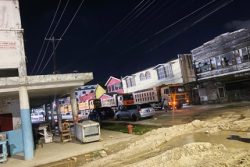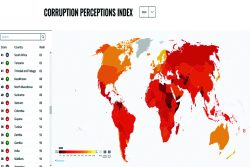Dear Editor,
In a terse statement on December 22, 2020, the Guyana Government stated that it did not share the reservations expressed by Dr. Bertie Ramcharan concerning the perspective that the ICJ has taken in establishing a framework for a final legal resolution of the 1899 Arbitral Award based on the Geneva Agreement. It should be noted that Dr. Ramcharan is not questioning the legality of the ICJ’s jurisdiction to handle the case, but rather the manner in which the International Court has defined and framed the issue upon which it will determine the final settlement.
To understand Dr. Ramcharan’s misgivings, it is important to revisit the application that was filed by Sir SS Ramphal and a battery of international lawyers on March 29, 2018 on behalf of Guyana, seeking intercession by the ICJ to draw a legal conclusion to the validity of the Arbitral Award of October 3, 1899. The requests are for ICJ to adjudicate and declare:
(a) “the validity of the Arbitral Award of 3 October 1899 and the related question of the definitive settlement of the land boundary dispute between the Co-operative Republic of Guyana and the Bolivarian Republic of Venezuela.”
(b) “Guyana and Venezuela are under an obligation to fully respect each other’s sovereignty and territorial integrity in accordance with the boundary established by the 1899 Award and the 1905 Agreement.”
While the court has determined that it has jurisdiction to examine and make judgment on the validity of the Arbitral Award of 3 October 1899, it has conflated its jurisdiction to include “the related question of the definitive settlement of the land boundary dispute between the Co-operative Republic of Guyana and the Bolivarian Republic of Venezuela.”
The Geneva Agreement upon which ICJ’s jurisdiction is guided made no mention of a dispute, but rather a controversy relating to Venezuela’s contention that the Arbitral Award of 1899 is “null and void.” (Geneva Agreement, Article V, February 1966}. Venezuela had speciously argued that the “practical settlement of the controversy” means a settlement of the border in which Guyana has to cede territory to Venezuela.
Dr. Ramcharan is of the view that for the ICJ to treat a “controversy” as a “dispute” is to play into the hands of Venezuela, which has deliberately presented the issue as a territorial dispute, after it was unable to offer any evidence to shake the validity of the 1899 arbitral agreement.
In fact, as late as of 1941 Venezuela had agreed that the frontier with Guyana was “well defined and was a closed issue,” based on an acknowledgement by Esteban Gil Borges, Venezuela’s then Foreign Minister. And even after 1944, when Severo Mallet-Prevost, one of the Venezuelan lawyers at the arbitral tribunal wrote a memorandum to attack the award, Venezuela continued to uphold the validity of the agreement. In 1962, Venezuela changed its tune laying claim to nearly two-thirds of Guyana, imputing for the first time a “territorial dispute,” which subsequently triggered negotiations in 1965 between Britain (along with representatives of British Guiana) and Venezuela that laid the groundwork for the Geneva Agreement.
It is of interest to note that Venezuela’s claim to “disputed territory” has shifted over the years. In 1982, Venezuela’s Ambassador to Guyana, Dr. Sadio Garavini at a press conference said that the solution would involve Guyana ceding some land, adding that they were not asking for all the land claimed. On August 7, 2000 Oliver Jackman, the UN Secretary General’s personal representative disclosed in Guyana that the Venezuelan President, Hugo Chavez viewed a ‘practical settlement of the controversy’ as the ceding of part of the Essequibo region. But in March 2015, Maduro took a more “aggressive stance” claiming ownership of much of Guyana’s maritime space, a move triggered by the discovery of oil by Exxon.
The facts outlined above give credence to Dr. Ramcharan’s view that ICJ’s definition of the issues under consideration for judgment offers an opening to the claim of Venezuela, which has so far chosen not to participate in the proceedings. ICJ’s characterization of the issue as a “land boundary dispute between the territories of the Parties,” also evoked a quizzical appraisal from Dr. Ramcharan, who stated “Territories don’t have disputes. Countries or people do.”
Dr. Ramcharan’s dim view of the ICJ’s conclusion that it does not have jurisdiction to entertain Guyana’s claims “arising from the events that occurred after the signature of Geneva Agreement,” also has justification. The ICJ’s declaration closes the door to any hope for Venezuela to withdraw “from and cease its occupation of the eastern half of the Island of Ankoko, and each and every other territory which is recognized as Guyana’s sovereign territory in accordance with the 1899 Award and 1905 Agreement.” Dr. Ramcharan appropriately questions the mission of the ICJ in choosing to ignore the plight of a small state that is at the mercy of a larger aggressor. In my view, it constitutes a dereliction of responsibility for the Court to fail to uphold the “principles of legality and justice” in a situation where the smaller state is the victim.
Concerning Dr. Ramcharan’s regret, that the ICJ failed to refer to the legal precedence it created in its recent ruling on a case involving the Mauritius Chagos Islands, could not such an issue be raised by Guyana’s legal representatives when the case comes up for final judgment? The Court in that ruling held that a country inscribed on the UN register for decolonization is entitled to its full territory upon independence. Guyana, then British Guiana, was already inscribed on the UN register for decolonization in the entirety of its territory as was settled by the 1899 Arbitral Award.
That judicial opinions vary on the same facts presented is not new, and that even Justices in the highest court may arrive at different conclusions is common, make for a dynamic, vibrant, and healthy legal environment with free and fresh thought. If the conclusions are logical, clear, and free from influences other than those imposed by legal strictures then justice is met, though not to the preference of all.
Yours faithfully,
Ramdular Singh






